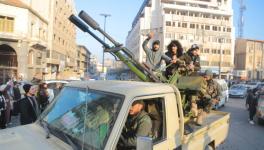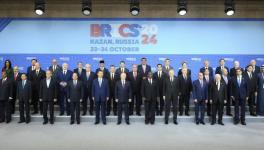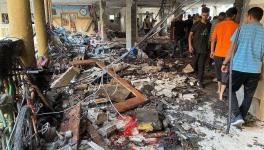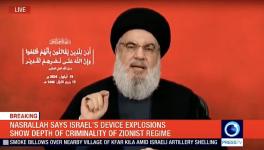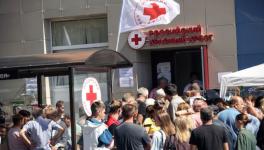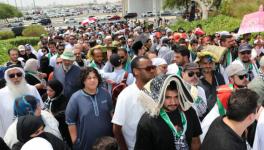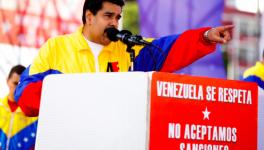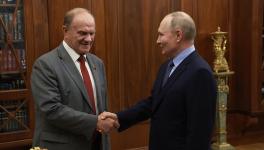Turkey is now Acting Independently of the U.S. and NATO on Syria
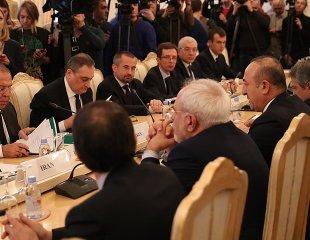
Photo Credit: Russian Foreign Ministry
In Moscow, a day after the assassination of the Russian Ambassador to Turkey, the foreign and defense ministers of Iran, Russia and Turkey met for a serious conversation. On the agenda was Syria and the destructive war there which has cost the lives of at least half a million people and displaced half the country’s population. What began six years ago in Tunisia as a civic uprising and earned the name ‘Arab Spring’ is now ghoulish—a brutal war prosecuted by Saudi Arabia and armed by the West against Yemen, the horrifying carnage in Syria, and the suffocation of hopes in Egypt. A pall of gloom hangs over West Asia and North Africa—a glance backward at the pile of corpses and a glance forward at that pile mirrored to infinity. Expectation that a meeting in Moscow can sort the tragedies out is low. It is enough to hope for a ceasefire.
Out of the ‘Moscow Declaration’ comes one essential truth: the West is no longer at the table. A senior Turkish bureaucrat told me that Turkey’s about-face here is quite significant. ‘Imagine’, said the bureaucrat, ‘if Pakistan at the height of the proxy war in Afghanistan decided to cut its ties with the United States and the Saudis and traveled to Moscow to meet with the Soviet leadership. That is what Turkey has done’. This might be an exaggeration. Turkey has not cut its ties to NATO, nor has it made any explicit statement about its relationship to the United States. But nonetheless, Turkey has entered into open discussions with Iran and Russia without the US being in the room. This by itself is a sufficient shock. ‘All previous attempts by the United States and its partners to agree on coordinated actions were doomed to failure,’ said the Russian defense chief Sergey Shoigu. ‘None of them wielded real influence over the situation on the ground.’
But there is more to digest. The Russian entry into Syria in 2015 ended any real expectation for regime change in Damascus. Turkey’s own internal challenges—driven largely by the government itself and exacerbated by its aggressive posture against the Assad government—pushed the Turkish government to a reassessment of its policy. The move to overthrow Assad had inadvertently strengthened the hands of the Syrian Kurds, which raises once more for Turkey the specter of a Kurdish homeland on its borders (there is already the autonomous Iraqi Kurdish region). Anatolian business interests that were squeezed by Turkey’s war and by the retreat of Russian business links put pressure on the Turkish government to do a deal with Russia. Neither the shooting down of a Russian fighter jet by the Turkish armed forces nor the assassination of the Russian ambassador in Ankara could alter Turkey’s pivot to Russia. Turkey’s foreign minister - Mevlüt Çavuşoğlu - said that the street where the ambassador was killed would be named for him. Russian investigators have arrived in Ankara to work with Turkish investigators. These are signs that the two states do not want tensions to come between them.
What these new relations with Russia meant was that Turkey cut its ties to its own proxies in Syria, and refused to allow free passage to Gulf Arab proxies that had used the Turkish border to resupply their units in northern Syria. It was this maneuver that enabled the Syrian army to recapture eastern Aleppo, which had been held—in the main—by proxy armies of the Gulf Arabs and the Turks (as well as small—militarily insignificant—Syrians who had not yoked themselves to regional powers).
The ‘Moscow Declaration’—signed by the three countries—says that ‘Iran, Russia and Turkey are ready to facilitate the drafting of an agreement, which is already being negotiated, between the Syrian government and the opposition, and to become its guarantors.’ It asks other powers to help cement the deal. This includes not only the Gulf Arabs, who would be essential to any final deal, but also the West. It is a telling sign that the next phase of the negotiations will not be held in Geneva (Switzerland), but will be in Astana (Kazakhstan). The shadow of the West will not be on the agreement. Turkey certainly does not represent the opposition at the table. Neither the Istanbul-based Syrian Muslim Brotherhood nor any other group has the power to influence the deliberations. That the Syrian army continues to pummel opposition areas near Damascus and that it has already announced that it will move into Idlib suggests that there is no check on the ambitions of the government in Damascus. It wants to prosecute a total victory. Even Turkey seems unwilling to challenge the Assad government’s agenda.
As the Syrian army takes more territory inside Syria, the various extremist groups will surely lash out in the region and inside Syria itself. A bomb blast in Istanbul killed 44 people exactly a week before a police officer shot the Russian Ambassador. In Jordan, militants created mayhem in the town of Karak, ceasing the old Crusader castle for a few hours. If there had not been a gas cylinder explosion in the Qatraneh apartment of the extremists, they would have perhaps been able to perpetuate something more macabre than their hasty dash to Karak castle. In Damascus, a seven-year old girl was used as the vehicle for a suicide bomb—a morbid symptom of moral degeneration. These are events linked by the frustrations of the extremists who are either taking revenge on their enemies or on their former allies. More such violence is certain.
No Syrian was at the table in Moscow. Syrians have not been at many of these discussions about the fate of Syria. Their various proxies have spoken for them. Fractured by disagreements by the regional powers, the various Syrian political opposition fronts are in disarray. The most important front—the High Negotiations Committee—has floundered to react to these changes. Bassma Kodmani told the Associated Press that she was in favor of the Moscow meeting. Kodmani, who publicly criticized the militarization of the conflict in October 2011, has long favored some kind of negotiated settlement. But she does not speak for many in the political opposition, who are unyielding on their demand for Assad to go. Even Riyad Hijab, Assad’s former Prime Minister who defected to the rebels in August 2012, said he would accept Moscow’s leadership on the negotiations. But Hijab holds out for the removal of Assad, a view not shared with the Russians or with Turkey. It is also a view no longer shared with many members of the Arab League, including Egypt and Algeria.
Within Syria, the agony of its people continues unabated. A new report from the Syrian Centre for Policy Research, based between Beirut and Damascus, suggests that the situation is intolerable. The report—entitled ‘Forced Dispersion: A Demographic Report on Human Status in Syria’ (December 2016)—shows that the humanity of Syrian children has been squandered, Syria’s social structure has been deeply damaged and violence has come to be the language most frequently spoken in the country. ‘The children’s chances of attending schools are limited,’ they point out, ‘as many of them are forced to work in inhumane conditions to provide for their families.’ Birth rates have declined, death rates have risen and ‘families and communities have been exposed to deep shock.’ Murder, torture, rape, kidnapping, theft and other such violence ‘destroys the culture and values’ of Syrian society. These have become endemic. Internally displaced Syrians long to return to their homes, where they hope to rebuild some measure of stability. The data suggests that people simply want the guns to stop firing and their lives to be determined by ordinary rhythms and not those of war.
If the Astana negotiations were able to expand the zones of ceasefires, then that would be beneficial. There was a time when the Assad government was deeply weakened and willing for political reconciliation with its adversaries. That weakness is no longer in sight. But the arrogance of victory might be an error. Beneath the new swagger, there is a broken country. The government will have to deal with the proliferation of arms and militias, the use of checkpoints for the collection of bribes and the breakdown of basic social norms. It will have to deal with rapacious real estate dealers and reconstruction hucksters who will drive up to rebuild Syria for a massive profit. Wars can be fought in the name of humanitarianism. So can profits be amassed. A ceasefire will be an important start for Syria. More will be needed to bring it out of its agony.
Disclaimer: The views expressed here are the author's personal views, and do not necessarily represent the views of Newsclick
Get the latest reports & analysis with people's perspective on Protests, movements & deep analytical videos, discussions of the current affairs in your Telegram app. Subscribe to NewsClick's Telegram channel & get Real-Time updates on stories, as they get published on our website.










